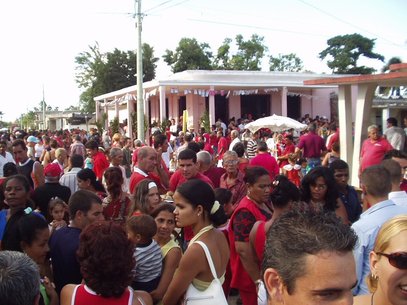Are You in the Yellow Pages?
 We aren't listed...
We aren't listed... By far, one of the most common kinds of posts I see on message boards and in my own e-mail is something along the lines of "Do you know any Santeros in... [name the place]?" People want to consult, or they want to find out more about how to get involved in the religion, or they are eager to establish some kind of godparent-godchild relationship and belong to a community. To an aleyo, or outsider, Regla de Ocha appears to be a closed and secretive society. There's no directory of services, no yellow pages, no search engine that can churn out the names of the Santero nearest you. There is no visible place of worship, like a church, where services are held on a particular day of the week at a particular time, where a stranger can wander in and get to know people. If you are looking for a Santero, it's hard to know where to begin.
People living in the modern western world are used to getting what they want when they want it. We expect the world to be organized into categories and information available and easy to access. If you need to find a doctor, you look here. If you need a carpenter, you look there. If you want to find a church, you type the name of your town and do a google search, and the list appears. More and more practitioners of Santería have created web pages advertising their services and making consultations available by telephone and skype for consumers who live around the globe. This is something our ancestors never imagined, and it stretches our traditions in uncomfortable ways. While there are no longer serious reasons why a Santero/a needs to hide his or her religious affiliations, it is still not the norm for practitioners to advertise for clients and promote themselves on the web. Yes, they are doing a service for people who are looking for spiritual guidance, but it doesn't replace the close personal relationships and ties to community that have characterized our religion for many hundreds of years.
People living in the modern western world are used to getting what they want when they want it. We expect the world to be organized into categories and information available and easy to access. If you need to find a doctor, you look here. If you need a carpenter, you look there. If you want to find a church, you type the name of your town and do a google search, and the list appears. More and more practitioners of Santería have created web pages advertising their services and making consultations available by telephone and skype for consumers who live around the globe. This is something our ancestors never imagined, and it stretches our traditions in uncomfortable ways. While there are no longer serious reasons why a Santero/a needs to hide his or her religious affiliations, it is still not the norm for practitioners to advertise for clients and promote themselves on the web. Yes, they are doing a service for people who are looking for spiritual guidance, but it doesn't replace the close personal relationships and ties to community that have characterized our religion for many hundreds of years.
Community Matters
 The community celebrates together
The community celebrates together My ilé, or religious home, is in Palmira, Cuba. Palmira is a small town in el campo, the countryside, where everyone knows everyone and most people seem to be related to each other in one way or another. The town was founded by descendents of African slaves and the majority of people there practice Regla de Ocha/ Ifa, if not as initiated priests, then as members of a community who drop by the home of a babalawo or santero/a for a consulta whenever they need it and, on special occasions, to enjoy the drumming and dancing that accompanies some ceremonies. Everyone knows where to go for a consulta, and they have their allegiances to one ilé or another- there are several important ones in the town. Children grow up in this setting and absorb the religion into their skin. There is nothing mysterious or secretive about it. Naturally, there are certain ceremonies that are not well known to the uninitiated members of society, but the religion itself is not scary, it is not forbidden and secret. People know who to go to when they have a problem, and the ilé functions as an informal community center, where people drop in without appointments and patiently wait for the babalawo or santero/a to have a free moment to do a consulta.
Since I don't live in Palmira, I can only participate in that community when I go there for visits. The physical distance presents an obstacle to my involvement in community gatherings for religious celebrations, but my elders prepared me for living abroad by teaching me that the physical distance doesn't matter. I am linked to them by tradition and by our lineage, their ancestors are my ancestors now, I carry them with me in my heart, and I will always be part of that community, no matter where I go.
In parts of the U.S.A. where there is a large Hispanic-Caribbean population, like New York/ New Jersey and South Florida, people have reproduced the kind of close-knit religious community that exists in Cuba. They know each other, work together, and have active ilés that turn out new godchildren, hold misas espirituales, tambores, and conduct other ceremonies frequently. I imagine that someone who lives in Union City, NJ, or in Hialeah/ Miami can find a santero around the corner, just by looking for the person dressed in white, wearing the beads, and listening for the chanting and drumming coming out of someone's basement or back room. But, what if you live in Iowa or Oregon or Kentucky, or a small town in Wales or in northern Sweden? What do you do? Chances are you don't know anyone who practices the religion, and all you can do is reach out in the dark, asking stranger online to help you find your path.
Since I don't live in Palmira, I can only participate in that community when I go there for visits. The physical distance presents an obstacle to my involvement in community gatherings for religious celebrations, but my elders prepared me for living abroad by teaching me that the physical distance doesn't matter. I am linked to them by tradition and by our lineage, their ancestors are my ancestors now, I carry them with me in my heart, and I will always be part of that community, no matter where I go.
In parts of the U.S.A. where there is a large Hispanic-Caribbean population, like New York/ New Jersey and South Florida, people have reproduced the kind of close-knit religious community that exists in Cuba. They know each other, work together, and have active ilés that turn out new godchildren, hold misas espirituales, tambores, and conduct other ceremonies frequently. I imagine that someone who lives in Union City, NJ, or in Hialeah/ Miami can find a santero around the corner, just by looking for the person dressed in white, wearing the beads, and listening for the chanting and drumming coming out of someone's basement or back room. But, what if you live in Iowa or Oregon or Kentucky, or a small town in Wales or in northern Sweden? What do you do? Chances are you don't know anyone who practices the religion, and all you can do is reach out in the dark, asking stranger online to help you find your path.
Finding Your Way
 Don't rush into things
Don't rush into things There's nothing wrong with that approach, but it's "iffy" at best. Someone who posts online that they are "looking for a godparent" is asking for trouble, because only the unscrupulous will take on a godchild he or she has never met. Many traditional practitioners of the religion question whether it is possible or ethical to do consultas over the phone or in any other form that is not direct person to person contact. If you find a botánica and walk in hoping to find a santero/a behind the counter, you could be in for a big disappointment. Botánicas are stores, and the owners may or may not be initiated priests and priestesses of the religion. They may or may not be honest and ethical. They may or may not want to talk to strangers.
This isn't the answer you want to hear, but it's the truth as I know it: if you are called to be in the religion, one way or the other, the Orichas will guide you where you need to go. You will unexpectedly meet people who will help you, you will come across unexpected opportunities, you will find yourself in situations where the religion becomes visible and accessible to you. You may have to travel, you will definitely need to keep your eyes open, you will need to pay attention to the possibilities that arise. There are santeros/as and babalawos almost everywhere in the world today. Some are visible and some are not. The professional person in the suit could be a santero/a, maybe it is the truck driver who delivers your new washing machine. Once you start to open your eyes, and especially when you start to venture out into the world, getting to know new people and moving in different circles, you will be surprised at what you see. The most important thing is to have faith and know it will happen when it's supposed to happen, if it's supposed to happen, and not let the urgency of your desire or your need drive you into unwise choices. Don't put yourself in the hands of someone whose credentials you don't know, don't hand over your money, your mind or your future to someone you don't trust. There are charlatans in every religion, and ours is no exception. It is better to be patient and wait for the right time, right place and right people, than to leap into a situation where you have a strong likelihood of becoming the victim or fraud or abuse.
This isn't the answer you want to hear, but it's the truth as I know it: if you are called to be in the religion, one way or the other, the Orichas will guide you where you need to go. You will unexpectedly meet people who will help you, you will come across unexpected opportunities, you will find yourself in situations where the religion becomes visible and accessible to you. You may have to travel, you will definitely need to keep your eyes open, you will need to pay attention to the possibilities that arise. There are santeros/as and babalawos almost everywhere in the world today. Some are visible and some are not. The professional person in the suit could be a santero/a, maybe it is the truck driver who delivers your new washing machine. Once you start to open your eyes, and especially when you start to venture out into the world, getting to know new people and moving in different circles, you will be surprised at what you see. The most important thing is to have faith and know it will happen when it's supposed to happen, if it's supposed to happen, and not let the urgency of your desire or your need drive you into unwise choices. Don't put yourself in the hands of someone whose credentials you don't know, don't hand over your money, your mind or your future to someone you don't trust. There are charlatans in every religion, and ours is no exception. It is better to be patient and wait for the right time, right place and right people, than to leap into a situation where you have a strong likelihood of becoming the victim or fraud or abuse.
 RSS Feed
RSS Feed
